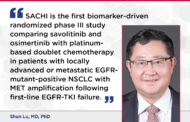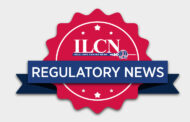
IASLC Names New Chief Operating Officer
J. Michael Hoehn, an executive leader with experience in nonprofit organizations, associations, and strategic planning, has joined IASLC as the association’s chief operating officer.
As an association management veteran, Hoehn has more than 25 years of experience in business consulting, having worked with organizations in both for-profit and nonprofit sectors improving operations, developing strategies, creating effective professional teams, and developing value recognition tools for potential customers.
“I enjoy helping associations improve operational effectiveness and survive in an increasingly complex and competitive marketplace. I am especially passionate about helping associations better adapt to the changes brought about by the digital revolution and helping boards and staff re-engineer business models to thrive in the 21st Century,” Hoehn said.
FDA Grants Accelerated Approval to Adagrasib for KRAS G12C-mutated NSCLC
The US Food and Drug Administration (FDA) recently granted accelerated approval to adagrasib, a RAS GTPase family inhibitor, for adult patients with KRAS G12C-mutated locally advanced or metastatic non-small cell lung cancer (NSCLC), as determined by an FDA-approved test, who have received at least one prior systemic therapy.
The FDA also approved the QIAGEN therascreen KRAS RGQ PCR kit (tissue) and the Agilent Resolution ctDx FIRST Assay (plasma) as companion diagnostics for adagrasib.
Approval was based on KRYSTAL-1, a multicenter, single-arm, open-label clinical trial that included patients with locally advanced or metastatic NSCLC with KRAS G12C mutations. Efficacy was evaluated in 112 patients whose disease progressed on or after platinum-based chemotherapy and an immune checkpoint inhibitor, given either concurrently or sequentially.
The objective response rate (ORR) was 43% (95% CI: 34%, 53%) and median duration of response (DOR) was 8.5 months (95% CI: 6.2, 13.8). The recommended adagrasib tablet dose is 600 mg orally twice daily until disease progression or unacceptable toxicity.
NHS England Gives General Practitioners Direct Access to Tests to Speed Cancer Diagnoses
Beginning in November 2022, the English National Health Service (NHS) expanded direct access to diagnostic scans for all general practitioners.
NHS chief executive Amanda Pritchard said in mid-November that general practitioners are already referring record numbers of patients for urgent cancer referrals—so much so that the shortfall in people coming forward for cancer screening caused by the pandemic has now been eradicated.
“This new initiative builds on that progress, supporting GPs to provide more opportunities for testing across the country for people who have vague symptoms,” Pritchard said. “By sending patients straight to testing, we can catch and treat more cancers at an earlier stage, helping us to deliver on our NHS long-term plan’s ambitions to diagnose three-quarters of cancers at stages one or two when they are easier to treat.”
General practices are now able to directly order CT scans, ultrasounds, or brain MRIs for patients with concerning symptoms, but who fall outside the National Institute for Health and Care Excellence (NICE) guideline threshold for an urgent suspected cancer referral.
According to NHS, hundreds of thousands of initial hospital appointments may be freed up under this approach by reducing the need for a specialist consultation first. Additionally, NHS estimates about 67,000 people who are usually diagnosed with cancer through non-urgent testing will now be eligible for fast-tracking and will have a better chance identifying their disease at an earlier stage.





